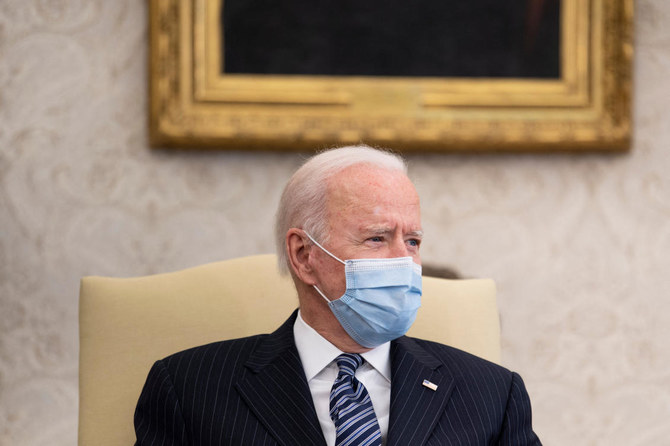WASHINGTON: US President Joe Biden’s administration accuses China of genocide but reached a joint pledge to cooperate on climate. The White House is also working to arrange a summit with Russia, despite imposing harsh new sanctions.
Biden’s strategy is not about easing tensions, so often the stated goal of diplomacy, but identifying narrow areas to work together — especially on climate change — while acknowledging that much of the relationship will remain hostile.
Biden alluded to America’s Cold War relationship with the Soviet Union last week after he ordered sanctions and the expulsion of Russian diplomats as a way to impose costs over Moscow’s alleged interference in US elections and a major hacking operation.
“We want a stable, predictable relationship,” said Biden, who proposed a summit in a neutral country during a telephone call with Russian President Vladimir Putin even while pressing him over the health of jailed dissident Alexei Navalny.
“Throughout our long history of competition, our two countries have been able to find ways to manage tensions and to keep them from escalating out of control,” he said.
Biden’s relationship with China is guided by a similar philosophy — described, in a colloquial phrase popular in his White House, as being able to walk and chew gum at the same time.
Secretary of State Antony Blinken, in a speech Monday, defended the approach from expected criticism by saying that no nation’s climate efforts would “excuse bad behavior.”
“Climate is not a trading card; it is our future,” Blinken said.
Climate envoy John Kerry, after a visit to Shanghai last week, issued a joint statement with China saying the two nations are “committed to cooperating with each other.”
However general in tone, it marked a stark contrast to a testy first meeting between top officials in March in Alaska, where Blinken raised concerns on a host of Chinese actions including what Washington has described as “genocide” against Uyghurs and other mostly Muslim Turkic-speaking people.
Biden has invited Putin and Chinese President Xi Jinping to a climate summit this week, with Kerry saying it would be tantamount to “killing yourself” not to work together on climate despite other disagreements.
Biden’s cool approach follows the highly personalized diplomacy of his predecessor Donald Trump, who voiced admiration for Putin and in his last year in office incessantly berated Beijing, which he blamed for the devastating Covid-19 pandemic.
Ryan Hass, a senior fellow at the Brookings Institution who advised former president Barack Obama on China, detected a “gradual but significant shift” in the stance toward Beijing under Biden.
“His administration has dialed down the rhetorical heat and focused purposefully on concrete areas of the relationship where American interests are impacted by Chinese actions,” Hass said.
“Both sides also have slowly begun restoring direct functioning channels of diplomatic communication to address areas of concern and explore opportunities for coordination.”
China and the United States are the world’s top two economies and together account for half of global emissions responsible for climate change. Russia is the fourth biggest emitter and Putin has accepted an invitation to speak at the climate summit.
Putin’s decision to participate “signals that he, too, is interested in preserving some space in the fraught US-Russian relationship,” said Heather Conley, a senior vice president at the Center for Strategic and International Studies.
But, Conley said: “Speaking at a virtual summit and mitigating climate impacts are two very different things.”
“What is striking to me is that while both Beijing and Moscow are speaking the language of climate change before international audiences, at home, they are putting their foot on the accelerator to increase global carbon emissions,” she said, pointing to Russia’s fossil-fuel industry and China’s reliance on coal plants.
In a recent essay, Andrew Erickson, a China expert at the US Naval War College, and Gabriel Collins of Rice University argued that the United States should look to compete rather than coordinate with China on climate. They said the United States could champion a carbon tax on exports — already backed by the European Union — to force China to cut back on coal.
“Xi’s bullish talk of combating climate change is a smokescreen for a more calculated agenda,” they wrote in Foreign Affairs.
“Chinese policymakers know their country is critical to any comprehensive international effort to curb greenhouse gas emissions, and they are trying to use that leverage to advance Chinese interests in other areas.”




























